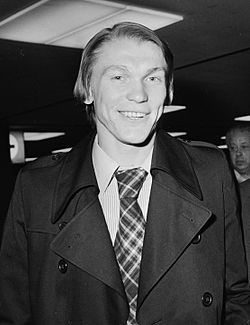| 1975 Ballon d'Or | |
|---|---|
 1975 Ballon d'Or winner Oleg Blokhin in 1977 | |
| Date | 30 December 1975 |
| Presented by | France Football |
| Highlights | |
| Won by | |
| Website | francefootball.fr/ballon-d-or |
The 1975 Ballon d'Or, given to the best football player in Europe as judged by a panel of sports journalists from UEFA member countries, was awarded to the Soviet forward Oleg Blokhin on 30 December 1975. [1] There were 26 voters, from Austria, Belgium, Bulgaria, Czechoslovakia, Denmark, East Germany, England, Finland, France, Greece, Hungary, Italy, Luxembourg, the Netherlands, Norway, Poland, Portugal, Republic of Ireland, Romania, Soviet Union, Spain, Sweden, Switzerland, Turkey, West Germany and Yugoslavia. [2] Blokhin became the second Soviet (and the first Ukrainian) footballer who won the trophy after Lev Yashin (1963). [3]